OLD POST ALERT! This is an older post and although you might find some useful tips, any technical or publishing information is likely to be out of date. Please click on Start Here on the menu bar above to find links to my most useful articles, videos and podcast. Thanks and happy writing! – Joanna Penn
I am just back from an amazing Thrillerfest, the annual convention of the International Thriller Writers in New York. I cannot recommend it highly enough if you're a thriller writer, or aspiring to be one.

I hope you find this useful and if this is your chosen genre, I hope you will also consider joining me next year at Thrillerfest. It was definitely a fantastic thing to do for my career as an author. I have tried to attribute comments where possible but the notes are all paraphrased so there may be errors, which are entirely my own.
The craft of writing
- If you're struggling with writing a character, write 20 things that the reader will never know about your character. These will naturally bleed into your writing and provide a richness even though you don't share the detail. [Barbara Poelle, Agent]
- In mysteries, red herrings are OK, lies are not. The ending must be surprising, but also inevitable. [Barbara Poelle, Agent]
- When a character is hanging by two fingers, chop one off. [Sophie Littlefield, author]
- How to make your readers cry: (a) say goodbye to a beloved character (b) say welcome home – all is forgiven [Donald Maass, Agent]
- How to make your readers angry and send you hate mail: Torture, maim or kill an animal (but you can do anything to people and get away with it!) [Sandra Brown, author]
- Keep the reader turning the page. No happy people in happy land. [James Scott Bell, author]
- There are no rules. We're storytellers. There's nothing wrong with telling sometimes. Why not start with the weather? Don't lock your writing into procedural rules. Keep asking questions because people will always want to know the answer. Open a question and don't answer it until the end. [Lee Child, author]
- Voice is literally the voice of the narrator. The written word is new. People have listened to stories for millennia. Your voice is the voice of the storyteller around the campfire. Our writing is an imitation of an audible experience. [Lee Child]
- The book is a snapshot of who you were at one point in time. You can't change it. It's who you were. [Lee Child]
- On writing a series. A series book is pre-approved by an audience who want the same caliber of experience. Why would Lee Child write something other than Reacher when he is the guy who writes Reacher, and people love those books? You have to work on keeping the series the same so people get what they expect. The contract with the reader is critical. Individually, we don't have to write everything. As an author collective, we cover all bases.
- “The reader is god.” Jeffrey Deaver, quoted by CJ Lyons. If you use this as your compass, you'll never go wrong. How can you please more readers?
Writing fight scenes and the ethical warrior
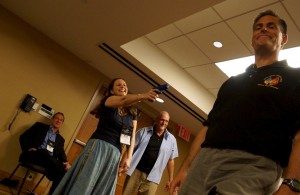
The following notes are from a session on the ethical warrior and writing fight scenes with Jack Hoban, from the Marine Martial Arts Program, Quantico. Amusingly, I was picked to play a helpless female who needed rescuing but I managed to take the gun off Jack.
- It is not natural to kill another human. You have to be trained to do it. If your character has to kill or injure someone, they can't just walk away. You can reduce psychological harm (and PTSD) by ensuring the individual acts in a moral sense. This cannot be based on relative values, which mean different things to different people e.g. religion, culture, race, way of life. Dehumanizing people leads to amoral action as has been seen in Rwanda, Nazi Germany and other places. Action and violence have to be based on human equality – the life value – and protecting that. Switch the emphasis to protector of life and those important to you, rather than an aggressor. Think that people are safer because of you and your skills. The philosophy of a hero is “I am your equal. My life and the lives of my loved ones are as important as yours.”
- Ethics are moral values you act upon. It takes guts and skills. To overcome the freeze or flee response, to risk yourself, takes courage. You are the protector of all life, with no differentiation between lives. If you think one life is worth more than another, this becomes a relative value. The combat mindset must include the core of life value as well as physical ability and mental toughness. This is the basis of the ethical warrior. The switch is violence as aggression to violence as protection.
- To understand more about this, read ‘The Ethical Warrior' by Jack E. Hoban. Also recommended: ‘On Killing' by Lt Col Dave Grossman; ‘Meditations on Violence' by Rory Miller.
Publishing, agents and self-publishing
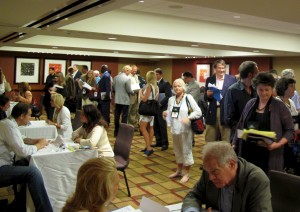
Agentfest was part of the convention where aspiring authors were able to pitch to four rooms of agents. You only had around four minutes with each agent but there was extensive information about what they were looking for, so you could target the right people. It was a kind of speed dating, as shown in the picture right.
The session was incredibly well organized and everyone I spoke to enjoyed it far more than expected. Most authors were also asked for partials or full manuscripts by at least one agent so it is a great way to move up the slush pile.
- Tips on pitching agents. One technique is to use the “What if? So What?” approach. e.g. What if a young girl risks her soul to love a vampire? What if a cyborg is sent back in time to kill the mother of the savior of mankind? Aim for less than 25 words. [Kathleen Antrim, author]
- The pitch is more about why do we care? The emotion behind the story. Or lead with your strength e.g. what's special about you and this book? Do you already have a platform? Are you an ex-CIA agent writing CIA thrillers? [Jon Land, author]
- Be proactive about getting your rights exploited. Study the publishers and what they are strong in, and then look at what else can be done. You don't know how people will discover you so the more formats your work is in, the better. Ebooks have a global market from day 1 and the global ebook market is starting to grow much faster, as the US growth slows.
- Publishing is the selling of a creative product where there are 10 million alternatives. This is a risky business. [Simon Lipskar, agent]
- If you don't think the representation you're getting is worth more than the commission you're paying, then fire your agent. [Simon Lipskar, agent]
Book marketing
- No book ever dies nowadays as it can be bought online forever, so throw out the old school publishing paradigm of the launch period. The book is new to anyone who has never read your book and finds it. No reader cares about a book being new or old. If it's a good book, people want to read it. Every day is a new day that people can discover your books. [MJ Rose, author and marketing expert]
- The average publishing spend on marketing is around $2000. The burden of marketing is on the author regardless of publishing method. A publisher expects you to have a website, a blog, Facebook, Twitter, Pinterest and an email list/newsletter. These are the basics so you need at least some of these. You have to find some way to interact with the world. [MJ Rose, author and marketing expert]
- Connect the author to a story to make it newsworthy. What non-fiction aspects can you use to blog about or write articles about? For example, in my ARKANE novels, I use aspects of religion, psychology, art, architecture and travel so I could write articles or use images of things that fit into these categories which will attract people in those niches. I'm doing this now at JFPenn.com and Pinterest/JFPenn.
- People overestimate the importance of marketing. The most important thing is to write the next great book. This was said by a number of people, most notably my friend CJ Lyons, shown with me on the right.
On being a professional author-entrepreneur
- Authors who succeed, who survive, are authors who love to write, who return to the love of writing again and again. The ups and downs of publishing will drive you crazy, so to survive, focus on what you love. [Lisa Gardner, author.]
- The more you can understand your own process as a writer, the more you can enable it. For example, do you write in a linear fashion or out of order? Are you a pantser or a plotter? Do you like actually writing, or having written? Everyone is different but you need to understand where you fit on the continuum. [Lisa Gardner]
- There are things you can do to encourage the muse. (a) Positive association. This is critical. Any day you write is a good day. Stop beating yourself up and find ways to make this a positive process. (b) Pavlovian responses. It takes 2 weeks to create a habit. You can create a writing habit with something that immediately creates the need to write. For example, scented candles, a designated computer or a designated writing space, a certain time of day. Think: when X happens, then I write. (c) Incentive systems. Bribing yourself is fine. For example, on pg 100, I go to the spa. Set celebration milestones for your books or the success will just pass you by. [Lisa Gardner]
- Everyone who writes for a living is an entrepreneur. Our time, exertion and creativity are investments we want to be paid for. You need to know the detail of your rights so you can protect them for the long term. Publishing is changing so fast and no one knows what the future will bring. If you're offered a publishing contract, consider what the publisher will bring you and examine the terms carefully. [Joseph Finder, author]
- Building a brand involves consistency of cover image, of voice and reading experience, of taglines or recurring themes in the books. People enjoy familiarity. Brand comes down to trust. The reader must trust what they are about to read. You can't disappoint them. It is also about differentiating your product from the rest.
My personal experience
- The long-term career path. I have spent the last few months trying to get to grips with being a full-time fiction author. I have been challenged by Steven Pressfield's ‘Turning Pro' and this convention was an extension of those lessons. To have a successful career as an author, you have to write, consistently and regularly, over a long period of time.The big name authors here are generally in their 50s and 60s, many with hundreds of books to their names. That is an awesome path to follow and this event definitely made me want to follow in their footsteps. I felt both inadequate and a total newbie, but also inspired enough to want to be able to say I have sold X million books one day. I highly recommend conventions like this for a kick up the butt and also inspiration for the future. I'm at the bottom of the ladder right now, but I can see the guys at the top 🙂
- I still feel conflicted over trad vs indie publishing. I know I love writing and marketing – they will happen regardless, and to a point, I know what I have to do. But publishing continues to be something I am unsure of. I joined in with Agentfest and pitched to a few agents who were suited to my ARKANE series. I had requests for the full manuscripts from a number of them, and I sent the books to those who I connected with. I'll let you know any news if there is some, but part of me loves the control of being indie. Ideally I will be a hybrid author as I continue with my career, with one foot in either camp. Watch this space for updates 🙂
Have you found conventions useful? What do you think about some of my lessons learned? Please do leave a comment.
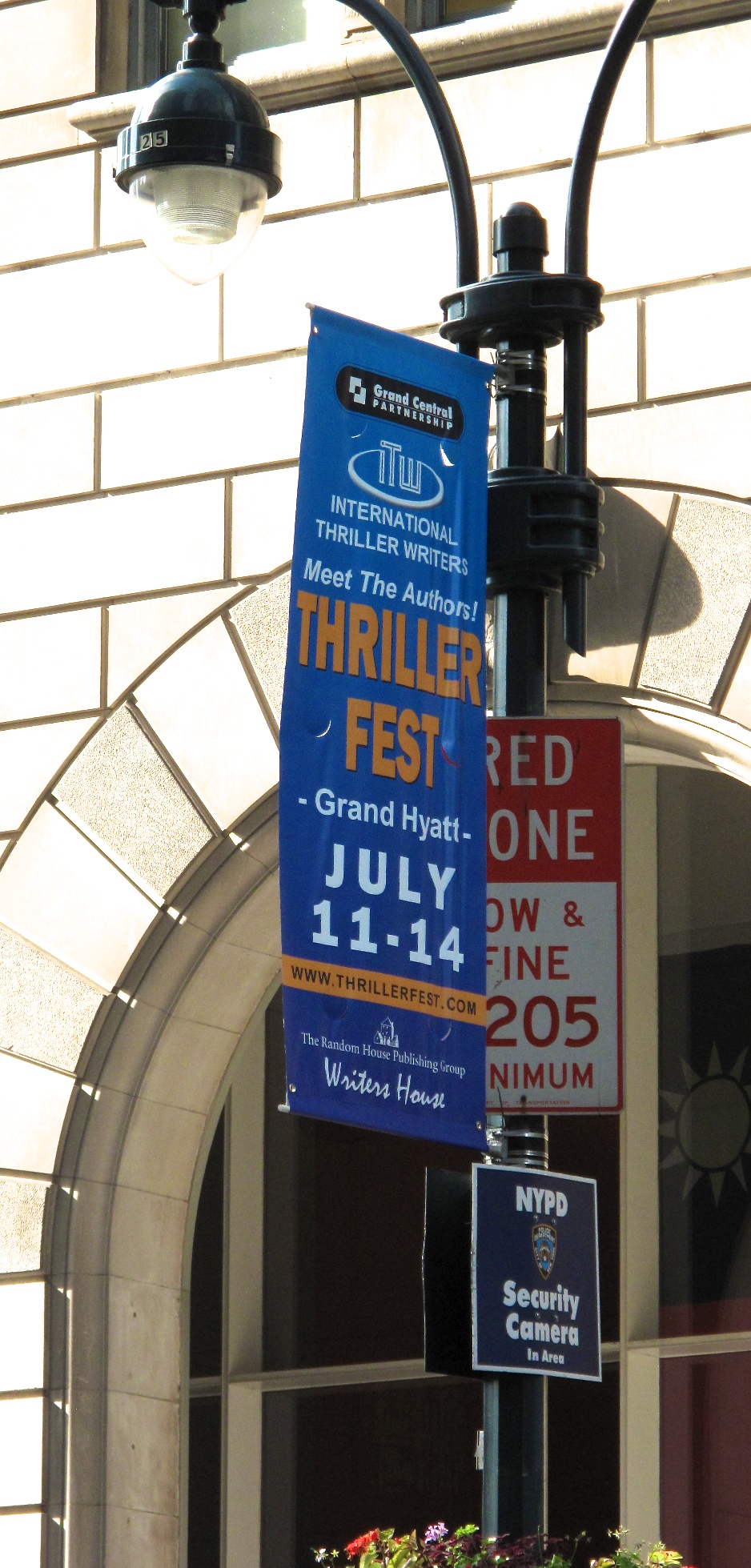
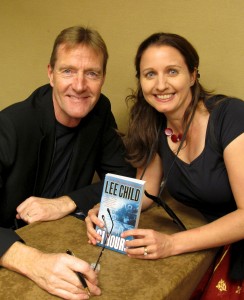
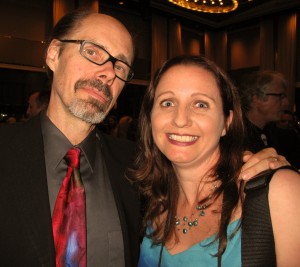
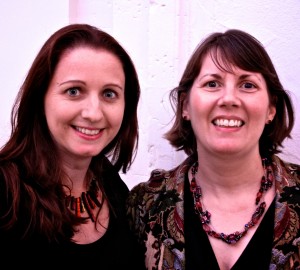
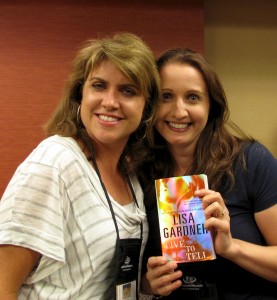
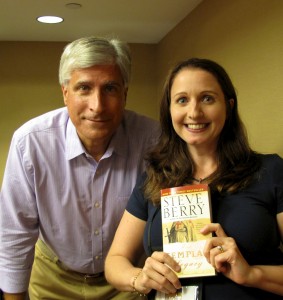


Thanks for sharing these 50 points with us, Joanna! Writers Conference are a substantial investment, especially when you have to come all the way from the UK, but they are worth every penny (or cent). Yes, it’s a kick up the butt. For sure. It’s also inspiring and the best way to build meaningful relationships with peers and mentors. It reinforces the commitment to my writing and my career as a writer, as a long-term project. I’m a romance writer and I’m flying next week to L.A. for The Romance Writers of America Conference. Just like ThrillerFest, it is opened to every author, published, pre-published, self-pub etc… Unfortunately, I don’t see the same kind of encompassing organizations in the UK… I guess Europeans are a bit more nosy 😉
Thanks Marion, and have an amazing time at RWA. I’ve heard it’s brilliant. I definitely think the conference was one of the best things I could have done for my career. Totally worth the investment and something I will hopefully do every year. The networking is critical. I did ask Lee Child (incoming president of ITW) about British events and it looks like there might be a thriller one. Of course, there are literary festivals and Harrowgate and Bristol crimefests, but other genres get less of a look-in …. something for us to organize perhaps?
yes, this would be definitely something to do. In the UK, there is the Romantic Novelists Association. But it’s only opened to “published” authors, and by that I mean “not self-pub” of course. That said they have a great scheme for New Writers where you get your mss critiqued by a published author (and it only costs £120). For any romance writers out there, it’s a great opportunity to seize. But I absolutely love the RWA… I’m American by heart 😉 Anyway, well done for the pitching (I did it last year and I loved it). I have no doubt you’ll have agents fighting to represent you very soon!
Completelt green over your Thrillerfest trip (one day I’ll get there from Aus), and loved the points you shared – the ethical warrior points are particularly helpful for me as a thriller writer, and the info on publishing is always helpful as I weigh up all the options available.
Fingers crossed on good outcomes from the agentfest.
Hi Hunter, I had booked to go from Oz before but the flight was just too expensive. It’s much easier from London of course, so I totally understand why it’s harder for you 🙂 I’m glad you enjoyed the wrapup though.
I have been to a Writers’ Conference in Winchester, UK a few times and found it useful but you have to pick and choose the sessions you attend.
If you go to these events more than once you can hear the same thing repeated but I always think positively that if I learn one useful thing in a session then it has been a good session. And I like the energy that a good event generates in me. It makes me want to go home halfway through the day and do some writing and I always get loads of ideas from them.
Exactly, and the networking is critical 🙂
Thanks Joanna for your quotations.
I like especially this one: “The book is a snapshot of who you were at one point in time. You can’t change it. It’s who you were. [Lee Child]” – it’s very interesting when we think about some books 😉
BR, Chris
Joanna, great wrap up! I was only there for ThrillerFest as a debut author so thanks for the info on agent and craft fest. Sounds like it was an amazing time for you. I like the idea that everyone who writes for a living is an entrepreneur – and thank goodness writers are such a sharing, generous bunch so it makes that entrepreneurship less painful. I always get so much out of conferences – from craft to the business and to making new friends.
Hi Donna, maybe we’ll meet next year 🙂 Congrats on your debut.
Hi, joannna
Man I would love to have been to thrillerfest. I would love to be at any writers’ conference for that matter . I live in states but no where near New York and still can’t go. 🙁
Just reading this makes me want to grab my laptop or notepad and get writing . It’s just something about being around people that share the same passion as you that gets you going.
Thanks for sharing your experience.
It’s something to save for and aim towards Shaquanda. I think it’s worth it 🙂
I attended a conference in Atlanta two years ago and it was fantastic. Just meeting other writers (and aspiring authors) and hearing their experiences made it worth the investment. But it was also a reminder that, as you said, to be a writer is to be an entrepreneur.
I love the comment that everyone who writes is an entrepreneur. And that what you write is a snapshot of who you were at that time. I’ve found that to be true, even though I’ve tried fighting against it and struggle with not putting too much “me” into the stories.
The picture of you pointing the gun is hilarious…doesn’t quite fit with how soft-spoken you are in the podcasts.
I have some other gun photos too – I love shooting 🙂
http://pinterest.com/jfpenn/the-thriller-life-travel-and-adventure/
Hi Joanna
To me, the most strikingly relevant point in your article was made by MJ Rose about ‘no launch period’ needed for E-BOOKS. This is becoming clearer by the day to an increasing number of writers. E-Books stay on the virtual shelves forever, evergreen, with cover displayed, gradually increasing in visibility, and can’t be ‘sent back’ after a 30 days as with a traditional book store.
These are the days.
Jonathan Gunson
Indeed, I think you would have had fun Jonathan 🙂 MJ Rose did a brilliant session helping people with promotional ideas for their books.
I love writers’ conferences! I’ve been to large and small ones over the years. Seventeen national conferences with Romance Writers of America. I write romance. I always come home with information and inspiration and motivation. I wish I were heading to Anaheim next week, but I can’t go this year.
Barb
Hi Joanna,
You’re bang on about seeing the guys at the top from the bottom of the ladder. There’s an old song that goes “It’s crowded at the bottom but empty at the top.” So we newbies need to figure out what those at the top did right and do the same thing. And make the commitment.
Also, I love Lee Child’s analogy about sitting around a campfire telling a story. You tell a story, not show it, and way too much confusion exists over this show & tell thing. Stephen King’s advice in “On Writing” is to think of your book as a letter to the ideal reader. Strikes me that these two guys have been pretty successful and I think we should listen to the successful writers, more so than to the agents & editors!
Garry Rodgers
Vancouver, Canada
Yes, I agree on listening to the pros . I’m reading stephen king’s “on writing” right now nd I love his view point.
To know the best you have to learn from people who know what they’re doing. 🙂
Lee Child did a brilliant session actually – he is confident and humble at the same time. His main message is to be true to yourself and the story you want to tell, and not to get too caught up in the “should do this” type of advice.
I think that’s a great way to go about it Joanna. If your not true to yourself than you may not be that passionate about the peice of work you’re writing and without passion the work will become robotic and stale.
Joanna,
This was a marvelous blog post. I’ve been to a zillion conferences, but never a major one like ThrillerFest. You so make me wish I’d gone (and I write mystery!). But these quotes are phenomenal. Thanks for such a great snapshot of the event.
C. Hope Clark
http://www.fundsforwriters.com
wwww.chopeclark.com
Hi Hope, I think you’d enjoy it a lot – thrillers are tangentially mystery based. I’ll be there next year 🙂
Great overview, sounds like an amazing few days. I feel you can enjoy both Rad and Self Publishing, so I hope some Agents get on board. It would be amazing to be able to take things to the next level
Good luck coming back to England. The weather is ‘slightly’ better than it was 🙂
Matthew (Turndog Millionaire)
I like ‘Rad’ publishing 🙂 good typo.
Great post, very helpful! I’m attending my first writing conference in October (SIWC) and looking forward to it.
A treasure trove of advice, thanks Joanna for an excellent post!
One question: about “voice”. It’s something that I wonder about (when I started to write 40 years ago, one talked of writing style, not voice). I still think the voice should not be that author’s but the characters’ voices: which means that a book, depending on the point of view of course, could conceivably be written in several voices!
What’s you take on this? Was it discussed at the meeting?
Hi Claude, The character’s ‘voice’ is covered under character or point of view. The author’s voice is something consistent across multiple books in a brand. For example, I love Lisa Gardner’s books. She has a lot of different characters and POVs but her own voice comes through in all the books. It’s difficult to articulate but it is definitely not the character in the context voice was discussed. Thanks.
50 points! Wow, lots of red meat…thanks. I considered going, since my upcoming novel and others will probably be thriller/mystery-oriented, but the total cost made me shudder. Might have come if could have found willing roomate to split four hotel nights. (maybe a chatroom/meeting link on next year’s Thrillerfest would be useful for me and others.)
I AM going to Killer Nashville in August (closer to home, less expensive) mostly for the networking opportunities. Hope to have blog (@#$%^&) up by then. Enjoy your blog. Maybe we’ll meet sometime. Thanks for the 50.
Sometimes we have to make an investment in our careers as writers. I felt that Thrillerfest offered me the kind of opportunities it was worth paying for – but we all have to make these kind of decisions for ourselves. I paid for it using income from Amazon for my existing fiction.
This was super helpful and really pushed me to understand something…I have to cut off some fingers today. 🙂
These characters we create–well, its impossible not to have great affection for them. And I realized this week that I’m allowing my characters to *procrastinate* a bit…no one’s finding the murderer or suffering the anguish from a death…but today, I’m afraid they’re all going to cry.
They have you to thank…
Here’s to page turning fiction!
Thank you so much for your wonderful post! It contains so many important points to consider. What a conference, or what excellent skills you possess at selecting topics important to writers. I always enjoy reading your blog and especially this post! Best wishes.
Thanks for sharing your experience! I love that this particular list round-up applies to all writers, not just thriller writers! Shows how universal the experience is.